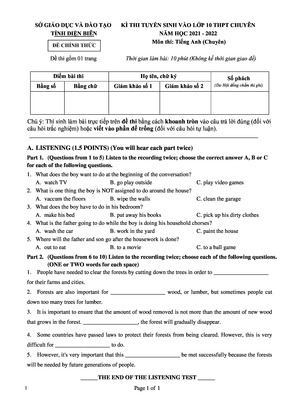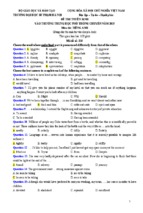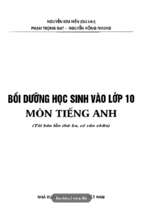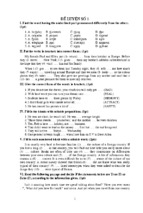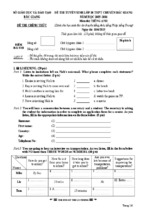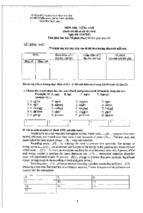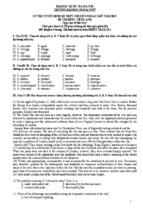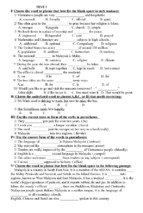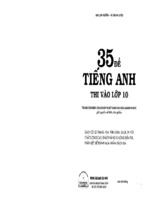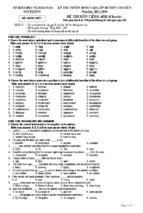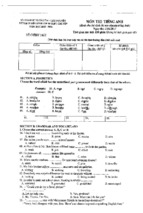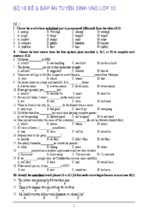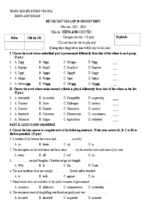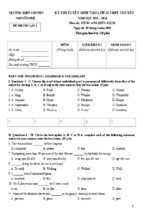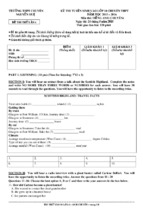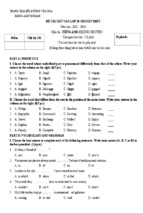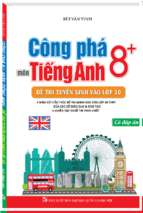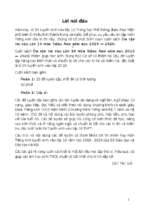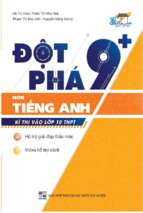File PDF tài liệu ôn tập thi tuyển sinh vào lớp 10 môn tiếng Anh
A – REVIEW
I. NGỮ ÂM
1. Phát âm từ
1.1. Quy tắc phát âm đuôi –ed
ĐỘNG TỪ tận cùng bằng
Khi thêm –ed phát âm là
Phụ âm vô thanh /t/ hoặc phụ âm hữu thanh /d/
/id/
7 phụ âm vô thanh /p/, /k/, /f/, /θ/, /s/, /∫/, /
/t/
t∫/
Các trường hợp còn lại
/d/
Một số trường hợp không tận cùng bằng /t/, /d/ nhưng khi thêm –ed được phát âm là /id/:
Hatred (sự căm ghét)
wretched (tả tơi)
beloved (được yêu quý)
Wicked (nham hiểm)
crooked (luồn cúi)
unmatched (không gì sánh bằng)
Rugged (lởm chởm)
ragged (rách nát)
1.2. Quy tắc phát âm đuôi –s
CÁC TỪ tận cùng bằng
5 phụ âm vô thanh /p/, /k/, /f/, /θ/, /t/
Các phụ âm / t∫/ /dʒ/ /s/ /z/ /∫/ /ʒ/
Các trường hợp còn lại
Khi thêm –s phát âm là
/s/
/iz/
/z/
1.3. Một số quy tắc phát âm khác
Đuôi -tion
- Phát âm /∫n/ trong đa số trường hợp: education
- Phát âm là /ʒn/ trong từ equation
-stion phát âm là /t∫n/ : question
Phát âm th
- Khi th ở đầu từ:
+ Các từ chức năng (đại từ, tân ngữ, mạo từ, liên từ ) -> phát âm là /δ/
Ví dụ: they, them, the, therefore, then
+ Đa số các từ loại khác -> phát âm là /θ/
+ Các từ smooth, with -> phát âm là /δ/
- Khi thêm hậu tố vào từ để biến đổi dạng từ, th chuyển phát âm từ /θ/ thành
/δ/. Ví dụ:
+ south /θ/-> southern /δ/
_ youth /θ/-> youths /δ/
2. Trọng âm từ
2.1. Một số quy tắc cơ bản
- DANH TỪ và TÍNH TỪ thường có trọng âm ở ÂM TIẾT ĐẦU.
- ĐỘNG TỪ thường có trọng âm ở ÂM TIẾT CUỐI.
- Âm tiết yếu /ə/ không nhận trọng âm.
- Âm tiết dài thường có khả năng nhận trọng âm.
- Đa số các tiền tố không ảnh hưởng đến vị trí trọng âm.
Ví dụ: uninimirdisrepre- post- non- over- Đa số các hậu tố không ảnh hưởng đến vị trí trọng âm.
Ví dụ: -ful
-less -able -al
-ous -ly
-er/or -ing -ise/ize
2.2. Các đuôi khiến trọng âm rơi vào âm tiết trước nó
Đuôi
Ví dụ
Đuôi
Ví dụ
Đuôi
1. –tion
Condition
9. –graphy
Photography
17. –iency
2. –sion
Division
10. –etry
Geometry
18. –ian
3. –ic/ ical
Terrific,
11. –eous
Advantageous 19. –ium
musical
4. –ity
Community
12. –ious
Delicious
20. –nomy
Ví dụ
Efficiency
Technician
Gymnasium
Economy
5. –ial
6. –ual
7. –itive
8. –logy
Essential
13. –ety
Anxiety
21. –meter
Individual
14. –ance
Reliance
22. –ury
Competitive
15. –ience
Impatience
23. –ory
Biology
16. –ient
Convenient
24. –ute
* trừ television
* trừ arabic, politics, lunatic
2.3. Các đuôi nhận trọng âm
Đuôi
Ví dụ
Đuôi
Ví dụ
Đuôi
1. –ade
Lemonade
9. –aire
Millionaire
17. –press (v)
2. –oo
Bamboo
10. –self
Myself
18. –tract (v)
3. –ique
Unique
11. –ain (v)
Maintain
19. –sist (v)
4. –mentary
Documentary
12. –dict (v)
Predict
20. –mit (v)
5. –ee/ -eer*
Engineer
13. –pel (v)
Compel
21. –ect (v)
6. –ese
Vietnamese
14. –fer (v)
Prefer
22. –vert (v)
7. –ette
Cigarette
15. –test (v)
Detest
8. –esque
Picturesque
16. –rupt (v)
Erupt
* trừ coffee, committee, employee
2.4. Các đuôi khiến trọng âm rơi vào âm tiết cách nó 1 âm tiết
Đuôi
Ví dụ
Đuôi
Ví dụ
Đuôi
1. –ate
Communicate 3. –tude
Attitude
5. –ary*
2. –ite
Opposite
4. –ative
Initiative
* trừ extraordinary
Kilometer
Injury
Memory
Contribute
Ví dụ
Express
Attract
Assist
Commit
Affect
Convert
Ví dụ
January
II. CÁC THÌ CỦA ĐỘNG TỪ
1. Thì HIỆN TẠI
1.1. Hiện tại đơn
S + V(s/es)
* Diễn tả:
Thói quen – Chân lí – Chu kì đều đặn – Bình luận thể thao trực tiếp – Viết trong sách, báo – Thời gian
biểu, lịch trình.
* Các cụm từ thường dùng: from time to time, every now and then, occasionally, generally, always, often,
usually, frequently, sometimes, rarely, seldom, never, etc.
* Nhấn mạnh dùng do/ does + V: He does love you!
1.2. Hiện tại tiếp diễn
S + am/ is/ are + V-ing
* Diễn tả:
- Hành động đang xảy ra tại thời điểm nói.
- Hành động đang xảy ra xung quanh thời điểm nói.
- Hành động có tính tạm thời; một sự biến chuyển, thay đổi.
Ví dụ: He usually goes to work by bus, but today he is driving his car.
- Sự phàn nàn, dùng với các từ: always, forever, constantly.
- Hành động đã được lên kế hoạch, sắp xếp thực hiện trong tương lai.
* Các cụm từ thường dùng: now, right now, for now, at the moment, at present, for the time being, today,
these days, this week, etc.
* Chú ý: Không dùng hiện tại tiếp diễn với các động từ sau:
- Ý kiến: agree, disagree, deny.
- Tư duy: believe, consider (coi như), doubt (hoài nghi), expect (mong đợi), imagine (tưởng tượng),
know, mean (có nghĩa là), realise (nhận ra), suppose (coi như), suspect (nghi ngờ), think (+of: cho rằng),
understand.
- Tồn tại: exist.
- Tình cảm: adore (ngưỡng mộ, yêu quý), appeal (thu hút), desire (khao khát), dislike, envy (ghen tị),
fear (lo sợ), forgive (tha thứ), hate, like, love, mind (phiền), need, prefer (thích hơn), satisfy (thỏa mãn),
trust (tin tưởng), want, wish.
- Tri giác: appear (dường như), seem (có vẻ), sound (nghe có vẻ), look (nhìn có vẻ), taste (có vị),
recognise/ recognize (nhận ra), smell (có mùi).
- Sở hữu: have, belong, possess, consist, contain, cost, lack, own, owe.
1.3. Hiện tại hoàn thành
S + have/ has + P2
* Diễn tả:
- Hành động bắt đầu trong quá khứ, kéo dài liên tục đến hiện tại.
(for + khoảng thời gian; since + mốc thời gian ở quá khứ; since + quá khứ đơn; since then)
- Kết quả của hành động tính đến thời điểm hiện tại (so far, up to now, until now).
- Hành động đã từng/ chưa từng xảy ra tính đến hiện tại (ever, never)
- Hành động đã xảy ra bao nhiêu lần tính đến hiện tại.
(It’s + the first/ second/ third/…+ time + Hiện tại hoàn thành)
- Hành động vừa mới xảy ra. (just, recently, lately, in the last few days)
- Hành động chưa xảy ra như mong đợi (câu phủ định và nghi vấn ). (yet)
- Hành động xong trước mong đợi. (already)
- Sau so sánh nhất.
- Hành động đã xảy ra trong khoảng thời gian chưa kết thúc: today, this evening, this year, etc.
1.4. Hiện tại hoàn thành tiếp diễn
S + have/ has been + V-ing
* Diễn tả:
- Hành động bắt đầu trong quá khứ, kéo dài liên tục đến hiện tại, đang xảy ra ở hiện tại và có thể tiếp tục
đến tương lai.
Ví dụ: It has been raining for more than two hours.
- Hành động vừa mới chấm dứt, có hậu quả/ kết quả tạm thời.
2. Thì QUÁ KHỨ
2.1. Quá khứ đơn
S + Ved
S + was/ were
* Diễn tả:
- Hành động xảy ra và đã chấm dứt trong quá khứ.
- Sự thật, thói quen trong quá khứ.
- Nhấn mạnh, dùng did + V: He did love you!
2.2. Quá khứ tiếp diễn
S + was/ were + V-ing
* Diễn tả:
- Hành động đang diễn ra tại một thời điểm trong quá khứ.
- Hành động đang diễn ra xung quanh một thời điểm trong quá khứ.
- Sự biến chuyển, thay đổi trong quá khứ.
- Sự phàn nàn trong quá khứ. (always, forever, constantly)
- Hai hành động xảy ra song song trong quá khứ.
- Một hành động đang diễn ra trong quá khứ (dùng quá khứ tiếp diễn) thì một hành động xen vào, cắt
ngang. (dùng quá khứ đơn)
Ví dụ: We were talking about John when he suddenly came in.
2.3. Quá khứ hoàn thành S + had + P2
* Diễn tả:
- Hành động đang xảy ra và hoàn tất trước một hành động khác trong quá khứ.
- Hành động hoàn tất tính đến một thời điểm trong quá khứ.
2.4. Quá khứ hoàn thành tiếp diễn
S + had been + V-ing
* Diễn tả: Hành động/ tình huống diễn ra liên tục tới một thời điểm trong quá khứ.
2.5. Used to V
* Diễn tả:
- Thói quen trong quá khứ đã không còn ở hiện tại.
- Sự tồn tại của sự vật trong quá khứ.
3. Thì TƯƠNG LAI
3.1. Tương lai đơn
S + will + V
Shall chỉ dùng cho ngôi I và we
* Diễn tả:
- Một phỏng đoán vô căn cứ cho tương lai.
- Một quyết định ngay tại thời điểm nói, chưa có kế hoạch, dự định.
- Sự hi vọng, lời hứa, lời từ chối.
- Suy nghĩ, quan điểm chủ quan.
- Lời đề nghị.
www.minh-pham.info
Ví dụ: That box seems heavy. I will help you carry it upstairs.
3.2. Tương lai tiếp diễn
S + will be + V-ing
* Diễn tả: Hành động đang diễn ra tại một thời điểm trong tương lai.
3.3. Tương lai hoàn thành
S + will have + P2
* Diễn tả:
- Hành động hoàn tất trước một thời điểm/ hành động trong tương lai.
- Hành động kéo dài tới một thời điểm trong tương lai được bao lâu.
3.4. Tương lai hoàn thành tiếp diễn
S + will have been + V-ing
* Diễn tả: Hành động bắt đầu trong quá khứ, kéo dài liên tục đến một thời điểm trong tương lai và đang
diễn ra tại thời điểm đó.
3.5. Tương lai gần
S + am/ is/ are + going to V
* Diễn tả:
- Dự định cho tương lai đã được sắp xếp, lên kế hoạch từ trước.
- Dự đoán sự việc trong tương lai có căn cứ vào dấu hiệu ở hiện tại.
Ví dụ: The sky looks cloudy. It is going to rain.
3.6. Các cấu trúc khác về tương lai
- To be to V:
sắp đặt chính thức/ phải làm gì
- To be about to do sth:
sắp sửa làm gì
- To be on the point of doing sth: sắp sửa làm gì
- To be on the verge of doing sth: có nguy cơ sẽ
- To be due to V;
sẽ đến hạn làm gì
- To be bound/ certain/ sure to V: chắc chắn sẽ làm gì
- To be (highly) (un)likely + to V/ that + tương lai đơn: rất/ không có khả năng sẽ
- The chances are that + tương lai đơn:
rất có khả năng sẽ
- There’s every + chance/ likelihood + of sth V-ing:
rất có khả năng sẽ
- There’s a strong/ a distinct chance/ possibility that + tương lai đơn: rất có khả năng sẽ
- The odds are against sth;
rất ít khả năng sẽ
III. DẠNG ĐỘNG TỪ
V + V-ing
V + to V
V + O + to V
Avoid (tránh)
Afford (đủ khả năng)
Advise (khuyên)
Admit (thừa nhận)
Agree (đồng ý)
Allow (cho phép)
Advise (khuyên nhủ)
Appear (xuất hiện)
Ask (yêu cầu)
Appreciate (đánh giá)
Arrange (sắp xếp)
Beg (van xin)
Complete (hoàn thành)
Ask (hỏi, yêu cầu)
Cause (gây ra)
Consider (xem xét)
Beg (nài nỉ, van xin)
Challenge (thách thức)
Delay (trì hoãn)
Care (chăm sóc)
Convince (thuyết phục)
Deny (từ chối)
Claim (đòi hỏi, yêu cầu)
Dare (dám)
Discuss (thảo luận)
Consent (bằng lòng)
Encourage (khuyến khích)
Dislike (không thích)
Decide (quyết định)
Expect (mong đợi)
Enjoy (thích)
Demand (yêu cầu)
Forbid (cấm)
Finish (hoàn thành)
Deserve (xứng đáng)
Force (buộc)
Keep (tiếp tục)
Expect (mong đợi)
Hire (thuê)
Mention (đề cập)
Fail (thất bại)
Instruct (hướng dẫn)
Mind (phiền, ngại)
Hesitate (do dự)
Invite (mời)
Miss (nhớ, bỏ lỡ)
Hope (hi vọng)
Need (cần)
Postpone (trì hoãn)
Learn (học)
Order (ra lệnh)
Practice (luyện tập)
Manage (sắp xếp)
Permit (cho phép)
Quit (nghỉ, thôi)
Mean (ý định)
Persuade (thuyết phục)
Recall (nhắc nhở, nhớ)
Need (cần)
Remind (nhắc nhở)
Recollect (nhớ ra)
Offer (đề nghị)
Require (đòi hỏi)
Recommend (nhắc nhở)
Teach (dạy)
Resent (bực tức)
Tell (bảo)
Resist (kháng cự)
Urge (thúc giục)
Risk (rủi ro)
Want (muốn)
Suggest (đề nghị)
Tolerate (chịu đựng, bao dung)
Understand (hiểu)
Can’t help (không nhịn được)
It is no use/ no good (vô ích)
Would you mind
Be used to (quen với)
Be/ get accustomed to (dần
quen với)
Be busy (bận rộn)
Be worth (xứng đáng)
Look forward to (trông mong)
Have difficulty/ fun/ trouble
Warn (báo trước)
IV. SỰ TƯƠNG HỢP GIỮA CHỦ NGỮ VÀ ĐỘNG TỪ
1. Chủ ngữ của câu là hai danh từ nối với nhau bằng ‘and’
- Hai danh từ cùng chỉ một người/ một vật -> Vsố ít.
Ví dụ: The director and actor is here. (cùng một người là đạo diễn kiêm diễn viên)
- Hai danh từ cùng hai người/ hai vật khác nhau -> Vsố nhiều.
Ví dụ: The director and actor are here. (hai người khác nhau)
2. Câu có hai danh từ làm chủ ngữ nối với nhau bằng: with, together with, along with,
accompanied by, added to, in addition to, as well as, including -> động từ chia theo DANH TỪ THỨ
NHẤT
Ví dụ: The girl with her brother is here.
3. Câu có hai danh từ làm chủ ngữ nối với nhau bằng: or, nor, not only….but also, either…or,
neither…nor -> động từ chia theo DANH TỪ THỨ HAI
Ví dụ: You and I am wrong.
4. Chủ ngữ của câu là
- The number of + Nsố nhiều -> Vsố ít
- The numbers of + Nsố nhiều -> Vsố nhiều
- A number of + Nsố nhiều -> Vsố nhiều
5. Chủ ngữ là các cụm từ
- All, Most, Some, Half, The majority, The minority,….%, x/y, None + of + Nsố ít -> Vsố ít
Ví dụ: 99% of your success depends on your hard work.
- All, Most, Some, Half, The majority, The minority,….%, x/y, None + of + Nsố nhiều -> Vsố nhiều
Ví dụ: All of the students are excited about the coming trip.
6. Các danh từ luôn luôn là số nhiều: police, staff, cattle, poultry, crew, clergy (giới tăng lữ),
troops, goods, congratulations, army
Ví dụ: The police are here.
7. Các đại lượng chỉ tiền, thời gian, khối lượng, khoảng cách, kích cỡ luôn luôn là số ít.
Ví dụ: Twenty five minutes is not enough.
8. Chủ ngữ là hai danh từ nối với nhau bằng giới từ -> động từ chia theo DANH TỪ THỨ NHẤT
Ví dụ: The legs of the table are too short.
9. ‘The + adj’ chỉ một tập hợp người, một tầng lớp, một dân tộc -> Vsố nhiều
Ví dụ: The rich are not always happy.
10. Tên môn học, bệnh, tạp chí, địa danh tận cùng bằng ‘s’ -> Vsố ít
Ví dụ: Physics is my favourite subject.
11. Câu có chủ ngữ là ‘There’ thì động từ chia theo danh từ thứ nhất sau chủ ngữ.
Ví dụ: There is a dog, two cats and three birds in the garden.
12. Chủ ngữ là hai danh từ nối với nhau bằng cấu trúc both…and -> Vsố nhiều
Ví dụ: Both you and I are wrong.
13. Chủ ngữ là danh từ bắt đầu bằng: every…, no…, and… -> Vsố ít
Ví dụ: Everything is ready.
14. Each, Every, Neither, Either of + Nsố nhiều -> Vsố ít
Ví dụ: Each of the students is ready.
15. Each, Every + N1 and each/ every + N2-> Vsố ít
16. Many a + Nsố ít -> động từ chia SỐ ÍT: biết bao nhiêu….
Ví dụ: Many of a good man has been destroyed by drink.
17. The + họ + ‘s’: cả gia đình -> Vsố nhiều
Ví dụ: The Blacks are here.
18. A great many + Nsố nhiều -> Vsố nhiều
Ví dụ: A great many students like learning English.
19. Các danh từ chỉ tập hợp: family, team, group, etc.
- Chia động từ số ít khi ngụ ý cả 1 gia đình, đội, nhóm….
- Chia động từ số nhiều khi ngụ ý nhấn mạnh các thành viên.
V. CÂU ĐIỀU KIỆN
1. Câu điều kiện LOẠI 1 (Một giả thiết có thể xảy ra trong tương lai)
If + S + V (thì hiện tại), S + will + V
Ví dụ: If the weather is fine, we will go swimming tomorrow.
* Có thể thay S + will + V bằng:
- S + can/ may + V.
- S + be going to + V.
* Câu mệnh lệnh:
Chuyển sang câu đảo ngữ: bỏ If, đảo Should lên trước chủ ngữ.
Ví dụ: Should you meet her tomorrow, ask her to phone me.
2. Câu điều kiện LOẠI 2 (Một giả thiết trái với chân lí, sự thật ở hiện tại, không thể xảy ra)
If + S + Ved (thì quá khứ đơn/ quá khứ tiếp diễn), S + would/ might/ could + V
Ví dụ: If I were taller, I would be a model.
Chuyển sang câu đảo ngữ: bỏ If, đảo Were lên trước chủ ngữ.
Were + S + (to V), S + would + V
* Câu điều kiện loại 2 với nghĩa: Nếu không vì….,…..
If I were not for sb/ sth, S + would + V
= Were it not for sb/ sth, S + would + V
= But for sb/ sth, S + would + V
= Without sb/ sth, S + would + V
Ví dụ: If it were not for this bad weather, we would be on the beach now.
3. Câu điều kiện LOẠI 3 (Một giả thiết trái với sự việc trong quá khứ, không thể xảy ra)
If + S + had P2, S + would/ might/ could + P2
Ví dụ: If he had stayed at home last night, he would have met her.
Chuyển sang câu đảo ngữ: bỏ If, đảo Had lên trước chủ ngữ.
Ví dụ: Had he stayed at home last night, he would have met her.
* Câu điều kiện loại 3 với nghĩa: Nếu không vì….,…..
If it had not been for sb/ sth, S + would + have P2
= Had it not been for sb/ sth, S + would + have P2
= But for sb/ sth, S + would + have P2
= Without sb/ sth, S + would + have P2
Ví dụ: If it had not been for the rain, we would have gone swimming yesterday.
4. Câu điều kiện HỖN HỢP
4.1. Câu điều kiện hỗn hợp 3 – 2 (giả thiết trái với sự thật trong quá khứ dẫn đến kết quả trái với
sự thật ở hiện tại)
If + S + had P2, S + would/ might/ could + V
Ví dụ: If he had graduated from a university, he would get this job now.
4.2. Câu điều kiện hỗn hợp 2 – 3 (giả thiết trái với sự thật không thể thay đổi dẫn đến hành động
không thể xảy ra trong quá khứ)
If + S + V(quá khứ đơn), S + would/ might/ could + have P2
Ví dụ: If I were taller, I would have been a model ten years ago.
5. Các từ nối có thể thay thế IF
- Unless: Nếu….không….
- In case: Để đề phòng trường hợp
- Provided, Providing, As long as: miễn là
- Suppose, Supposing, Imagine: giả sử
- Câu điều kiện với ‘or else’ hoặc ‘otherwise’ (Or else = otherwise = if not)
Ví dụ: I need to earn enough money, or else/ otherwise I will not buy that new car.
( = If I can’t earn enough money, I will not buy that new car)
VI. CÂU AO ƯỚC ( I wish = If only)
1. Ước cho hiện tại và tương lai (không có thật)
S1 + wish + S1/S2 + would + Ved(be = were)
Ví dụ: I am short of money. I wish I had a lot of money now.
2. Ước cho quá khứ (không có thật)
S1 + wish + S1/S2 + had + P2
Ví dụ: I wish I had gone to her party last week.
3. Phàn nàn về một việc không vừa ý đang hoặc sẽ xảy ra
S1 + wish + S1/S2 + would + V
Ví dụ: I wish you would stop making so much noise.
VII. CÁC LOẠI MỆNH ĐỀ PHỤ THUỘC TRONG CÂU GHÉP CHÍNH PHỤ
1. Mệnh đề chỉ SỰ NHƯỢNG BỘ
- Although/ Even though/ Though + S + V
Ví dụ: Though she is rich, she is mean.
- Although/ Even though/ Though + adj/ adv
Ví dụ: Though rich, she is mean.
- Although/ Even though/ Though + P2, S + V
Ví dụ: Though surrounded by a lot of people, he still found her.
- Although/ Even though/ Though + giới từ + N, S + V
Ví dụ: Although in difficulty, she helped me.
- S1 + V1. S2 + V2, though.
Ví dụ: She was in difficulty. She helped me, though.
* Đảo ngữ mang nghĩa nhượng bộ: Adj + though/ as + S + V
Ví dụ: Good looking though/ as she is, she didn’t win that beauty contest.
* Much as (mặc dù rất nhiều): Much as + S + V, S + V.
Ví dụ: Much as I tried, I couldn’t manage to deliver a good presentation.
* Cấu trúc tương đương với Although/ Though/ Even though:
- Despite/ In spite of + N/ V-ing, S + V.
- Despite/ In spite of + the fact that…, S + V.
Ví dụ: Despite/ In spite of being tired after a hard-working day, she spent the whole evening tidying up her
house. (= Although she was tired after a hard-working day, she spent the whole evening tidying up her
house.)
2. Mệnh đề chỉ MỤC ĐÍCH
So that/ in order that + S + V
Ví dụ: I am studying hard so that/ in order that I will pass the exam next week.
* Cấu trúc tương đương: so as to/ in order to + V
Ví dụ: I am studying hard so as to/ in order to pass the exam next week.
( = I am studying hard so that I can pass the exam next week.)
3. Mệnh đề chỉ NGUYÊN NHÂN
Because/ Since/ As + S + V
Ví dụ: I couldn’t go out because/ since/ as the rain was heavy.
* Cấu trúc tương đương: because of/ owing to/ due to/ thanks to + N/ Ving.
Ví dụ: I couldn’t go out because of the heavy rain.
4. Mệnh đề chỉ THỜI GIAN
- when S + V: khi….
Ví dụ: I saw her when she was walking over there.
- while S + V: trong khi…
Ví dụ: I was watching TV while she was cooking.
- before S + V: trước khi…
Ví dụ: She had learnt in this high school before she entered university.
- after S + V: sau khi…
Ví dụ: I will tell you after I have finished my work.
- as soon as S + V: ngay khi…
Ví dụ: You have to phone me as soon as you arrive.
- until S + V: cho đến khi….
Ví dụ: You have to wait here until I come back.
VIII. CÂU HỎI ĐUÔI
1. Một số quy tắc chung
- Mệnh đề chính dạng khẳng định -> phần đuôi dạng phủ định.
- Mệnh đề chính dạng phủ định -> phần đuôi dạng khẳng định.
Ví dụ: John is good at basketball, isn’t he?
- Mệnh đề chính có các yếu tố phủ định như: no, none, neither, hardly, seldom, rarely, scarely, barely ->
phần đuôi dạng khẳng định
Ví dụ: She hardly comes to class on time, does she?
- Chủ ngữ của mệnh đề chính là every…, no…, any… -> phần đuôi dùng….they.
Ví dụ: Everyone enjoyed the film, didn’t they?
2. Một số trường hợp đặc biệt
1. I am…., aren’t I?
5. ….used to V….., didn’t…..?
2. I am not…., am I?
6. ….had better…., hadn’t…..?
3. Câu mệnh lệnh, will you?
7. ….has/ have got…., hasn’t/ haven’t…..?
4. Let’s…., shall we?
8. There….., …..there?
IX. CÂU BỊ ĐỘNG
1. Cấu trúc biến đổi từ chủ động sang bị động
Thì/ Dạng của động từ
Chủ động
Bị động
Hiện tại thường
V(s/es)
is/ are P2
Hiện tại tiếp diễn
am/ is/ are + Ving
is/ are being P2
Quá khứ thường
Ved
was/ were P2
Quá khứ tiếp diễn
was/ were + Ving
was/ were being P2
Hiện tại hoàn thành
have/ has + P2
has/ have been P2
Quá khứ hoàn thành
had P2
had been P2
Tương lai thường
will V
will be P2
Tương lai gần
is going to V
is going to be P2
Động từ nguyên thể 1
to V
to be P2
Động từ nguyên thể 2
to have P2
to have been P2
Động từ -ing 1
Ving
being P2
Động từ -ing 2
having P2
having been P2
Động từ khuyết thiếu
can V
can be P2
2. Dạng nhờ bảo: HAVE/ GET
2.1. have sb do sth
- nhờ ai làm gì giúp cho: I often have my sister clean my room.
- ai làm việc gì gây tổn thất cho mình: i had a strange men steal my car.
2.2. have sth done (by sb)
- có việc gì được làm giúp bởi ai: I often have my room cleaned by sister.
- bị việc gì gây tổn thất cho mình: I had my car stolen by a strange man.
2.3. get sb to do sth
- nhờ ai làm gì giúp cho: I often get my sister to clean my room.
2.4. get sth done
- có việc gì được làm giúp bởi ai: I often get my room cleaned by my sister.
- tự mình phải làm gì cho xong: I must get my homework done tonight.
3. Câu bị động từ câu chủ động có hai mệnh đề
- Chủ động: S1 + V1 + (that) + S2 + V2 (V1= say, think, believe, report…)
- Bị động:
It + (be) + said/ thought/ believed/ reported + (that) + S2 + V2
S2 + (be) + said/ thought/ believed/ reported + to V2 (V1 và V2 cùng thì)
+ to have P2 (V1 và V2 khác thì)
+ to be V2-ing (tiếp diễn)
Ví dụ: People say that he was a doctor.
-> It is said that he was a doctor.
-> He is said to have been a doctor.
* Trong câu bị động, trạng ngữ chỉ địa điểm đứng trước by + tân ngữ, trạng ngữ chỉ thời gian đứng sau
by + tân ngữ.
Ví dụ: The house was built at the end of the street by the villagers ten years ago.
X. CÂU TRỰC TIẾP – GIÁN TIẾP
Biến đổi ĐẠI TỪ/ TÂN NGỮ/ TÍNH TỪ SỞ HỮU/ ĐẠI TỪ SỞ HỮU
Câu trực tiếp
Câu gián tiếp
I
He/ she
You
I/ me/ they/ them
We
They
Us
Them
My
His/ her
Your
My/ their
Biến đổi ĐỘNG TỪ
Câu trực tiếp
- Simple present
- Present progressive
- Present/ Past perfect/ Past simple
- Simple future
- Can/ May
- Must/ have to
- should/ ought to
- will/ shall/ won’t
- needn’t
Câu gián tiếp
- Simple past
- past progressive
- past perfect
- would + V
- could/ might
- had to
- should/ ought to
- would/ should/ wouldn’t
- didn’t have to/ needn’t
Biến đổi TỪ CHỈ THỜI GIAN/ ĐỊA ĐIỂM
Câu trực tiếp
Câu gián tiếp
- today/ tonight
- that day/ night
- yesterday
- the day before/ the previous day
- the day before yesterday
- two days before
- tomorrow
- the next/ the following day/ the day after
- the day after tomorrow
- in two days’ time
- next day/ week/…
- the following/ next day/ week
- last week/ month/…
- the previous week/ month; the week/ month
before
- ago
- before/ earlier
- now
- then
- this/ these
- that/ those
- here
- there
- in 5 days
- in 5 days’ time
1. Câu trần thuật
- Dùng động từ tường thuật: said that/ told sb that…..
Ví dụ: He said: “I am going to see you here tomorrow”.
-> He said that he was going to see me there the next day.
2. Câu hỏi YES – NO
- Dùng động từ tường thuật: ask/ inquire/ wonder/ want to know
- Sau động từ tường thuật dung ‘if’ hoặc ‘whether’
- Đổi cấu trúc câu hỏi thành câu trần thuật
Ví dụ: He said to me: “Do you like here?”
-> He asked me if I lived there.
3. Câu hỏi Wh- Dùng động từ tường thuật: ask/ inquire/ wonder/ want to know
- Sau động từ tường thuật dung từ để hỏi wh- (what, where, when, why, which, who, how long, how
far,…)
- Đổi cấu trúc câu hỏi thành câu trần thuật
Ví dụ: He said to me: “Where did you live ten years ago?”
-> He asked me where I had lived ten years before.
4. Câu mệnh lệnh, yêu cầu, gợi ý, khuyên….
Câu trực tiếp
Câu gián tiếp
What about + Ving?
Suggest + Ving
Why don’t you + V?
Suggest + Ving hoặc advise sb + to V
Could I have sth?
Ask for sth
Could you + V?
Ask sb to V
Would you mind + Ving?
Ask sb to V hoặc ask sb if he/ she could + V
Would you like sth?
Offer sth to sb
Would you like to go to…?
Invite sb to…
Would you like to V?
Invited sb to V
Shall I do sth for you?
Offer to V
Shall we + V?
Suggest + Ving
* Một số cấu trúc thường gặp:
- insist on (sb) Ving; insist that + S + V: khăng khăng
- demand to V; demand that + S + V: đòi hỏi
- request to V; request that + S + V: đề nghị
- require to V; require that + S + V: yêu cầu
- command sb to V: ra mệnh lệnh cho ai phải làm
- order sb to V; order that + S + V: ra lệnh
- instruct sb to V: ra hướng dẫn
- compel sb to V: ép buộc
- warn sb to V: cảnh báo
- urge sb to V: hối thúc
- accuse sb of Ving: cáo buộc
- apologize to sb for Ving: xin lỗi
* Khi chuyển câu phủ định sang gián tiếp thì chuyển động từ tường thuật (believe, expect, feel, intend,
plan, propose, suppose, want, think) sang phủ định.
Ví dụ: “I’m sure it is not dangerous’.
-> She didn’t thonk it was dangerous.
5. Các trường hợp câu gián tiếp KHÔNG LÙI THÌ CỦA ĐỘNG TỪ
5.1. Động từ tường thuật ở hiện tại
Ví dụ: He often says: “I am the best.”
-> He often says that he is the best.
5.2. Câu điều kiện loại 2 và loại 3
Ví dụ: He said: “If I had money, I would buy a car.”
-> He said that if he had money, he would buy a car.
5.3. Câu ao ước cho quá khứ, hiện tại, tương lai
Ví dụ: He said: “I wish I had a car.”
-> He said that he wished he had a car.
5.4. Chân lí, sự thật hiển nhiên
Ví dụ: He said: “The sun rises in the East.”
-> He said that the sun rises in the East.
5.5. Câu ở quá khứ đơn có điểm thời gian chính xác
Ví dụ: “He died in 1921/ on Monday.”
-> They told me that he died in 1921/ on Monday.
5.6. would rather, would sooner, had better, should, could, might
Ví dụ: “I would rather go by bike than walk”.
-> He said that he would rather go by bike than walk.
5.7. Mệnh đề sau ‘It’s time’
Ví dụ: He said: “It’s time I went home”.
-> He said that it was time he went home.
5.8. Mệnh đề sau as if, as though (không đúng với sự thật)
Ví dụ: He said: “She looks as if she were a queen”.
-> He said that she looked as if she were a queen.
XI. MỆNH ĐỀ QUAN HỆ
- Mệnh đề quan hệ đặt ngay sau danh từ mà nó bổ nghĩa và được bắt đầu bằng các từ quan hệ: who,
which, that, whose, when, where, why.
WHO: thay thế danh từ chỉ người, làm chủ ngữ hoặc tân ngữ của mệnh đề quan hệ.
WHOM: thay thế danh từ chỉ người, làm tân ngữ của mệnh đề quan hệ.
WHICH: thay thế danh từ chỉ vật, làm chủ ngữ hoặc tân ngữ của mệnh đề quan hệ.
THAT: thay thế danh từ chỉ người và chỉ vật, làm chủ ngữ hoặc tân ngữ của mệnh đề quan hệ.
WHOSE: chỉ sự sở hữu, sau ‘whose’ là danh từ.
WHEN (=on/ at/ in + which): thay cho trạng từ chỉ thời gian.
WHERE (=on/ at/ in/ from + which): thay cho trạng từ chỉ địa điểm.
WHY (=for which): thay cho từ chỉ lí do.
1. Mệnh đề quan hệ xác định
- Cung cấp thông tin quan trọng giúp xác định danh từ/ cụm từ đứng trước; giúp câu đủ nghĩa.
Ví dụ: My father is the man who understands me most.
- Không có dấu phẩy ngăn cách mệnh đề chính và mệnh đề quan hệ.
- Có thể bỏ từ quan hệ (who, whom, which, that) làm tân ngữ của mệnh đề quan hệ.
Ví dụ: He is talking about the girl who/ that he met last week.
2. Mệnh đề quan hệ không xác định
- Cung cấp thêm thông tin về danh từ/ cụm từ đã tự xác định đứng trước, có thể bỏ đi câu vẫn rõ nghĩa.
Ví dụ: The Moon, which was so bright, showed the beauty of the garden.
- Có dấu phẩy ngăn cách mệnh đề chính và mệnh đề quan hệ.
- Không dung ‘that’ với mệnh đề quan hệ không xác định.
- Sử dụng mệnh đề quan hệ không xác định với: all, both, few, most, several, some,… + of + whom/ which.
Ví dụ: I have two close friends, both of whom are living abroad now.
* Chú ý:
- ‘which’ có thể đứng sau dấu phẩy, thay thế cho nghĩa của cả mệnh đề trước nó.
Ví dụ: You won the race, which made me happy.
- Dùng ‘that’ để thay thế cho cụm danh từ bao gồm cả người và vật.
Ví dụ: The man and his dog that came here last night have been arrested.
- Dùng ‘that’ để thay thế cho cụm danh từ đi kèm so sánh nhất.
Ví dụ: This is the most delicious dish that I’ve ever tasted.
- Sau các đại từ nghi vấn: Who/What.
Ví dụ: Who is that made you sad>
3. Rút gọn các mệnh đề quan hệ
3.1. Rút gọn mệnh đề quan hệ thành ‘To V’
- Sau từ chỉ số thứ tự: first, second, next, last, etc.
Ví dụ: He was the last person who left the place.
→ He was the last person to leave the place.
- Sau ‘only’, ‘very’.
- Sau so sánh nhất.
- Chỉ mục đích.
3.2. Rút gọn mệnh đề quan hệ thành ‘V-ing’
- Khi mệnh đề quan hệ ở thể chủ động
Ví dụ: She is the lady who lent me her phone.
-> She is the lady lending me her phone.
3.3. Rút gọn mệnh đề quan hệ thành ‘P2’
- Khi mệnh đề quan hệ ở thể bị động.
Ví dụ: The book which was written by J.K. Rowling is very interesting.
-> The book written by J.K. Rowling is very interesting.
3.4. Rút gọn mệnh đề quan hệ thành cụm danh từ
Ví dụ: Ms. Young, who is our librarian, lent me this book.
-> Ms. Young, our librarian, lent me this book.
3.5. Rút gọn mệnh đề quan hệ thành cụm tính từ
Ví dụ: Anyone who is interested can come to the festival.
-> Anyone interested can come to the festival.
3.6. Rút gọn mệnh đề quan hệ thành cụm giới từ
Ví dụ: I want to borrow the book which is on the table.
-> I want to borrow the book on the table.
XII. ĐẢO NGỮ
1. Đảo ngữ trong câu đơn
Khi các từ/ cụm từ mang nghĩa phủ định đứng đầu câu với mục đích nhấn mạnh:
- No, Not, Neither, Nor, Never (before, again, in my life,…): không….
Ví dụ: Never have we witnessed such cruel behavior.
- Seldom, Barely, Hardly, Little, Scarcely: hiếm khi, hầu như không
- No longer/ No more: không…nữa, Nowhere: không nơi nào
- At no time: không bao giờ
- On no account: không vì bất kì lí do gì
- On no condition: hoàn cảnh nào cũng không
- In no way: không có cách nào
- In/ Under no circumstances: Dù trong hoàn cảnh nào cũng không
- Only giới từ + N/ Ving
Ví dụ: Only after saying goodbye did I realize that I had left my wallet in his car.
- Only in this way: chỉ bằng cách này
- Only then/ later: chỉ sau đó
Ví dụ: Only then did I understand what I had done.
2. Đảo ngữ trong câu phức
2.1. Vừa mới….thì đã….
- Hardly/ Seldom/ Barely/ Scarely + had + S + P2 + when + S + Ved
- No sooner + had + S + P2 + than + S + Ved
Ví dụ: No sooner had he finished dinner than he started feeling ill.
2.2. Không những….mà còn….
- Not only mệnh đề 1 ĐẢO NGỮ but S + also + V
- Not only mệnh đề 1 ĐẢO NGỮ but S + V + as well
2.3. Không thế này cũng chẳng thế kia
Neither mệnh đề 1 ĐẢO NGỮ, nor mệnh đề 2 ĐẢO NGỮ.
Ví dụ: Neither did she come to the party, nor did she reply to the invitation.
2.4. Chỉ khi mà….: Only when mệnh đề 1, mệnh đề 2 ĐẢO NGỮ
2.5. Chỉ nếu như….: Only if mệnh đề 1, mệnh đề 2 ĐẢO NGỮ
2.6. Chỉ sau khi….: Only after mệnh đề 1, mệnh đề 2 ĐẢO NGỮ
2.7. Chỉ trước khi….: Only before mệnh đề 1, mệnh đề 2 ĐẢO NGỮ
2.8. Mãi cho tới khi…: Not until + mốc thời gian/ mệnh đề 1, mệnh đề 2 ĐẢO NGỮ
Ví dụ: Not until I got home did I realise my bracelet was missing.
* Cấu trúc sau cũng có nghĩa là mãi cho tới khi…nhưng KHÔNG ĐẢO NGỮ:
It is/ was NOT UNTIL điểm thời gian/ mệnh đề 1 THAT mệnh đề 2
Ví dụ: It was not until I got home that I realized my bracelet was missing.
3. Đảo ngữ trong câu điều kiện
3.1. Câu điều kiện loại 1: bỏ ‘If’ và dung ‘Should’ đứng đầu câu.
Ví dụ: If we are lucky enough, we will be the champions of the football tournament.
-> Should we be lucky enough, we will be the champions of the football tournament.
3.2. Câu điều kiện loại 2: bỏ ‘If’ và dung ‘Were’ đứng đầu câu, nếu câu động từ chính là động từ thường
thì dung ‘to V’.
Ví dụ: If I were you, I wouldn’t do it.
-> Were I you, I wouldn’t do it.
3.3. Câu điều kiện loại 3: bỏ ‘If’ và đảo ‘Had’ lên trước chủ ngữ.
Ví dụ: If I had understood the problem, I wouldn’t have made those mistakes.
-> Had I understood the problem, I wouldn’t have made those mistakes.
4. Đảo tính từ/ trạng từ
4.1. Mặc dù…: Adj/ Adv + as/ though + S1 V1, S2 V2
Ví dụ: Hard as he tried, he couldn’t finish the project on time.
4.2. Cho dù như thế nào….:
- No matter how + adj/ adv + S1 V1, S2 V2
Ví dụ: No matter how hard he tried, he couldn’t finish the project on time.
- However + adj/ adv + S1 V1, S2 V2
4.3. Đến nỗi mà…: Such + be + S + that + mệnh đề 2
4.5. Dù cố gắng rất nhiều nhưng không thể….
- Hiện tại: Try as sb may, S + V
- Quá khứ: Try as sb might, S + Ved
5. Đảo động từ đã chia lên trước chủ ngữ
- Trạng từ chỉ địa điểm (Here, There, On, At, In, Inside, Outside, Behind)/ Trạng từ chỉ phương hướng
(Out, Up, Into, Down) đứng đầu câu -> đảo ĐỘNG TỪ ĐÃ CHIA lên trước chủ ngữ.
Ví dụ: Here comes our bus.
* KHÔNG ĐẢO NGỮ nếu chủ ngữ trong câu là đại từ: I, we, you, they, he, she, it.
Ví dụ: Here we come!
B – PRACTICE EXERCISES
SECTION 1 – PHONETICS
1.1. PRONUNCIATION
Choose the letter A, B, C or D to indicate the word whose underlined part is pronounced differently
from that of the others.
Exercise 1
1. A. predict
B. preparation
C. expect
D. extensive
2. A. abrupt
B. funnel
C. volume
D. thunder
3. A. climate
B. comprise
C. consist
D. divide
4. A. economic
B. conclusion
C. sailor
D. minority
5. A. united
B. university
C. universe
D. unknown
6. A. design
B. loose
C. style
D. symbol
7. A. choice
B. research
C. schedule
D. chopsticks
8. A. hobby
B. deny
C. poetry
D. primary
9. A. bottle
B. folk
C. orange
D. chopsticks
10. A. qualify
B. baggy
C. grocery
D. scenery
Exercise 2
1. A. home
B. come
C. some
D. honey
2. A. pray
B. separate
C. champagne
D. viable
3. A. depend
B. secondary
C. deposit
D. respond
4. A. correspond
B. minority
C. worship
D. course
5. A. crier
B. instruction
C. interactive
D. impress
6. A. remote
B. atmosphere
C. convenient
D. commercial
7. A. kits
B. photographs
C. laughs
D. chores
8. A. education
B. dangerous
C. modern
D. media
9. A. creature
B. bear
C. jeans
D. reach
10. A. channel
B. chat
C. school
D. chance
Exercise 3
1. A. rickshaw
B. carnival
C. ruin
D. island
2. A. setting
B. fortress
C. heritage
D. complex
3. A. recognize
B. recommend
C. protect
D. preserve
4. A. locate
B. situate
C. pagoda
D. landscape
5. A. behave
B. border
C. destroy
D. erupt
6. A. fixture
B. hurricane
C. lift
D. strike
7. A. volcano
B. damage
C. earthquake
D. teenager
8. A. laugh
B. highlands
C. flashlight
D. although
9. A. object
B. innovation
C. conserve
D. pollution
10. A. ultimately
B. funnel
C. erupt
D. nuclear
Exercise 4
1. A. urban
B. multicultural
C. stuck
D. rubber
2. A. manual
B. thatched
C. arctic
D. asset
3. A. exporter
B. pedestrian
C. entertain
D. event
4. A. frustrated
B. behave
C. tram
D. frame
5. A. dogsled
B. concentrate
C. complex
D. metropolitan
6. A. exporter
B. fortress
C. affordable
D. conduct
7. A. emergency
B. helpline
C. depressed
D. dweller
8. A. cooperative
B. igloo
C. boom
D. roof
9. A. metro
B. domed
C. oceania
D. workshop
10. A. citadel
B. cavern
C. administrative
D. paradise
Exercise 5
1. A. craft
B. lacquerware
C. factor
D. adulthood
2. A. concentrate
B. cognitive
C. workshop
D. confident
3. A. variety
B. limestone
C. tiled
D. rickshaw
4. A. conduct
B. urban
C. tunnel
D. stuck
5. A. complex
B. cavern
C. citadel
D. contestant
6. A. chopped
B. fried
C. starved
D. described
7. A. noodles
B. steams
C. vegetables
D. sausages
8. A. assigned
B. cooked
C. reduced
D. sliced
9. A. dessert
B. starter
C. mineral
D. mandarin
10. A. served
B. layered
C. enclosed
D. liked
Exercise 6
1. A. together
B. healthy
C. nothing
D. authentic
2. A. chef
B. charity
C. parachute
D. champagne
3. A. fee
B. degree
C. coffee
D. achieve
4. A. destination
B. vacation
C. question
D. urbanisation
5. A. facilities
B. cuisine
C. exist
D. cruise
6. A. prefer
B. wonder
C. quicker
D. consider
7. A. pioneer
B. peel
C. meat
D. green
8. A. expansion
B. explosion
C. vision
D. decision
9. A. natural
B. potential
C. mature
D. fluctuate
10. A. conserve
B. preserve
C. reserve
D. Japanese
1.2. WORD STRESS
Choose the letter A, B, C or D to indicate the word whose primary stress is placed differently from
that of the others.
Exercise 1
1. A. handicraft
B. lacquer
C. artisan
D. pottery
2. A. historical
B. embroidery
C. authority
D. architecture
3. A. famous
B. village
C. workshop
D. bamboo
4. A. business
B. experience
C. grandparent
D. chocolate
5. A. transfer
B. publish
C. accept
D. remind
6. A. adolescence
B. adulthood
C. cognitive
D. concentrate
7. A. confident
B. delighted
C. depressed
D. embarrassed
8. A. emergency
B. frustrated
C. independence
D. decision
9. A. relaxed
B. worried
C. wander
D. dweller
10. A. discipline
B. determine
C. cultural
D. indicator
Exercise 2
1. A. fabulous
B. reliable
C. variety
D. forbidden
2. A. craftsman
B. layer
C. sculpture
D. preserve
3. A. elegant
B. regional
C. musical
D. effective
4. A. recommend
B. thoroughly
C. travelling
D. fascinate
5. A. windsurfing
B. equipment
C. amateur
D. national
6. A. coincide
B. community
C. conception
D. committee
7. A. stimulate
B. organize
C. efficient
D. terminal
8. A. widlife
B. afford
C. mountain
D. passport
9. A. parabolic
B. astronomy
C. experiment
D. collaborate
10. A. spacewalk
B. trainee
C. object
D. private
Exercise 3
1. A. companion
B. spectacular
C. ecotourism
D. extraordinary
2. A. destination
B. picturesque
C. mausoleum
D. cathedral
3. A. atmosphere
B. astounding
C. attraction
D. amazing
4. A. impressive
B. imposing
C. peaceful
D. fantastic
5. A. tidal
B. abrupt
C. cyclone
D. hurricane
6. A. typhoon
B. compose
C. joyful
D. occur
7. A. forbid
B. cancel
C. repeat
D. prevent
8. A. machine
B. pollute
C. nature
D. exhaust
9. A. recent
B. reduce
C. suggest
D. collect
10. A. electricity
B. population
C. necessity
D. innovation
Exercise 4
1. A. arctic
B. occasion
C. rickshaw
D. noticeable
2. A. urban
B. asset
C. indicator
D. artisan
3. A. wander
4. A. layer
5. A. workshop
6. A. affordable
7. A. fabulous
8. A. picturesque
9. A. compartment
10. A. facility
Exercise 5
1. A. annoyed
2. A. rubber
3. A. skyscraper
4. A. surface
5. A. event
6. A. avacado
7. A. alternate
8. A. campaigner
9. A. exotic
10. A. comfortable
Exercise 6
1. A. international
2. A. obesity
3. A. computer
4. A. experiment
5. A. advertise
6. A. technical
7. A. discovery
8. A. quality
9. A. performance
10. A. emotionally
B. downtown
B. independence
B. mushroom
B. underpass
B. variety
B. recognition
B. exported
B. igloo
C. annoyed
C. confident
C. negative
C. lacquerware
C. reliable
C. adolescence
C. manual
C. event
D. astonished
D. sculpture
D. recognition
D. craftsman
D. remind
D. astonished
D. relaxed
D. embarrassed
B. astonished
B. astounding
B. downtown
B. limestone
B. index
B. archeology
B. accommodate
B. environment
B. romantic
B. development
C. pedestrian
C. administrative
C. craftsman
C. structure
C. metro
C. ingredient
C. facilitate
C. millennium
C. economic
C. vocabulary
D. sandals
D. relaxed
D. sculpture
D. illiterate
D. dweller
D. vinaigrette
D. communicate
D. populous
D. phonetic
D. derivatives
B. approximately
B. cigarette
B. itinerary
B. experience
B. candidate
B. package
B. spacesuit
B. benefit
B. financially
B. responsive
C. flexibility
C. intensively
C. passenger
C. expedition
C. astronaut
C. diameter
C. participate
C. opinion
C. externally
C. activity
D. understood
D. dramatically
D. enormous
D. excursion
D. astronomy
D. temperature
D. technology
D. purpose
D. exhibition
D. opportunity
SECTION 2 – ERROR IDENTIFICATION
Choose the letter A, B, C or D to indicate the underlined part that needs correcting in each of the
following questions.
Exercise 1
1. Mary was determined to leave (A) the office by (B) 4:30 for catching (C) early train home (D).
2. I often look into (A) new words in (B) the dictionary whenever (C) I don’t know their (D) meanings.
3. Even (A) on the most careful (B) prepared trip (C), problems will sometimes (D) develop.
4. The existence (A) of many stars in the sky lead (B) us to suspect that there may be (C) life on another
(D) planet.
5. It is believed (A) that in the near future (B) robots will be used to doing (C) things such as (D) cooking.
6. My father used to give (A) me a good advice (B) whenever (C) I had a problem (D).
7. The teacher asked him why (A) hadn’t he done (B) his homework, but (C) he said nothing (D).
8. Although his family is (A) poor, but (B) he studies (C) very well (D).
9. The package (A) must be wrapped (B) carefully before (C) it is post (D).
10. I am (A) very interesting (B) in problems caused (C) by pollution (D).
Exercise 2
1. No one would have attended (A) the lecture if you told (B) the truth about (C) the guest speaker (D).
2. Because (A) his sickness (B), he didn’t take (C) part in the English competition (D).
3. A galaxy, where (A) may include billions of (B) stars, is (C) held together (D) by gravitation attraction.
4. The tongue is the principal (A) organ of taste (B), and is (C) crucial for chewing, swallowed (D), and
speaking.
5. Each of the members(A) of the group were (B) made to write (C) a report every week (D).
6. Why don’t (A) you congratulate our son about (B) passing (C) his final (D) exam?
7. Neither of the girls (A) have (B) turned in the term papers to the (C) instructor yet (D).
8. The secretary told (A) me that an important file had left (B) in the lunch room just (C) the other (D)
day.
9. The (A) little boy’s mother bought him (B) a five-speeds (C) racing bicycle for (D) his birthday.
10. Since (A) fireworks are dangerous (B), many countries have laws to prevent (C) businesses to sell
(D) them.
Exercise 3
1. Dams are used to control flooding (A), provide water for irrigation (B) and generating (C) electricity
for the surrounding area (D).
2. The closer it gets to (A) December 21, the first day (B) of winter, the short (C) the days become (D).
3. Either (A) Mr Anderson or (B) Ms Wiggins are (C) going to teach our class today (D).
4. My parents (A) often take careful (B) of me when (C) I am ill (D).
5. Have you (A) ever read (B) any (C) novels writing (D) by Jack London?
6. Publishing in the UK (A), the book has won (B) a number of awards in (C) recent regional book fairs
(D).
7. Perhaps the most (A) unique thing about (B) carbon atoms are (C) their ability to combine (D) with
themselves.
8. Her family had great difficulty (A) to get (B) her transferred (C) to another (D) hospital.
9. Hardly he had (A) entered the office (B) when he realized (C) that he had forgotten (D) his wallet.
10. The economy is heavy (A) dependent on industry (B), and economic growth has always been (C) of
greater concern than (D) environmental preservation.
Exercise 4
1. Could you help (A) me do (B) this job? I don’t know how to get (C) it start (D).
2. The man was (A) unable discovering (B) who had thrown (C) stones at (D) him.
3. Many opinions have (A) been express (B) on the likely (C) effects of the computer (D).
4. Traditionally (A), Americans and (B) Asians have had very different (C) ideas about love and married
(D).
5. Many (A) teachers have devoted their (B) lives to (C) teaching therefore (D) teaching is not a wellpaid job.
6. Had it not (A) been for you help me (B), I wouldn’t (C) have succeeded (D).
7. There are (A) many different ways of comparing (B) the economy of one nation with those (C) of
another (D).
8. The number of (A) people who (B) survived the Titanic shipwreck (C) in 1912 were (D) quite small.
9. If a person really wants (A) to succeed, they (B) must always work (C) hard (D).
10. The number of wild condors, and endangered species of (A) bird, have been (B) increasing steadily
(C) because of (D) the work of scientists and environmnetalists.
Exercise 5
1. Newtonian physics account (A) from (B) the observation (C) of the orbits (D) of the plants and moons.
2. The (A) man whom (B) I want to meet him (C) was away on business (D).
3. The (A) result of (B) that test must (C) be informed (D) before August.
4. Vietnam exports (A) a lot of rice is grown (B) mainly in the south (C) of the country (D).
5. Today was such beautiful day (A) that I couldn’t bring myself (B) to complete (C) all my chores (D).
6. We were (A) advised (B) not driking (C) the water in (D) the bottle.
7. Jim and his brother are (A) alike (B); they both (C) look after (D) their father.
8. One of the most (A) serious problems (B) face (C) us now is the need (D) to control population growth.
9. Not until (A) I was on my way (B) to the airport that I realized (C) I had left my passport at home (D).
10. Students suppose (A) to read all the questions (B) carefully and find out (C) the answers to them
(D).
Exercise 6
1. What would (A) happen if (B) the temperature (C) is warmer (D)?
2. Some people enjoy preparing (A) their own meals while another (B) would rather eat (C) out
regularly (D).
3. It takes over (A) four years for light (B) from (C) the nearest star reaching (D) the earth.
4. There are (A) probably around (B) 3,000 languages speaking (C) in the world (D).
5. Those applicants who (A) return their completed (B) forms at (C) the earliest date that have (D) the
highest priority.
6. Please give (A) me a few (B) more sugar in (C) my coffee. I prefer (D) it sweet.
7. Some students think that get (A) a good mark is (B) the most important thing that (C) they must pay
attention to (D).
8. I didn’t (A) feel like to go to (B) work (C) this morning because it was raining hard (D).
9. Rattan, a close (A) relative of bamboo, is often (B) used to make (C) tables, chairs and other furnitures
(D).
10. Would you mind not (A) to smoke (B) on the bus? It disturbs (C) the other (D) people.
Exercise 7
1. There are thousands (A) of kinds of bacteria, many (B) of whom (C) are beneficial (D).
2. In stead of (A) their (B) frightening (C) appearance, the squid is shy and completely harmless (D).
3. One of the most (A) popular holiday (B) in the U.S. is (C) Thanksgiving, which is celebrated in (D)
November.
4. The girl whom about (A) we are talking (B) used to be (C) a Miss World (D).
5. After John eaten (A) dinner, he wrote (B) several letters (C) and went to bed (D).
6. Food prices (A) have risen (B) too (C) rapidly that we have to change our eating habits (D).
7. She asked why (A) did Mathew look (B) so embarrassed (C) when he saw (D) Carole.
8. When (A) I met John last year, he has already graduated (B) from (C) university for (D) a year.
9. Do you (A) think two hours are too (B) long to wait for (C) someone (D)?
10. My (A) mother still spends (B) 14 hours a day (C) do (D) the housework.
Exercise 8
1. Either (A) the doctor or the nurses takes (B) care of changing (C) the patients’ (D) bandages.
2. Please arrive (A) on time in order to (B) we will be able (C) to start (D) the meeting punctually.
3. They hardly never (A) go to the beach (B) because of (C) their sickness, do they (D)?
4. The people in Europe are now using (A) the common unit of money called (B) Euro, although (C) the
economies in those countries are not exact (D) the same.
5. Most (A) bacteria has (B) strong cell walls much (C) like those (D) of the plants.
6. The (A) first nation park in (B) the world, calling (C) Yellowstone Park, was established (D) in 1872.
7. My father used to giving (A) me some good (B) advice whenever (C) I had a problem (D).
8. All the (A) witnesses said that (B) John was blaming for (C) the accident (D).
9. The doctor advised him (A) to avoid eating (B) fatty foods, having (C) more fresh vegetables and drink
much (D) water.
10. People should not expect to rescue (A) by their parents every time (B) they get into (C) financial
difficulty (D).
SECTION 3 – GRAMMAR
Choose the letter A, B, C or D to indicate the word(s) that best fits the gap in each of the following
sentences.
Exercise 1
1. Mary isn’t_________her sister.
A. so pretty than
B. as pretty than
C. prettier as
D. as pretty as
2. They speak English_________than we do.
A. more fluently
B. fluentlier
C. most fluently
D. fluentliest
3. The competition makes the prices_________.
A. more cheap and cheap
C. cheaper and cheaper
B. more cheap and more cheap
D. cheaper and cheapest
4. Which is_________planet in our solar system?
A. smaller
B. smallest
C. the most small
D. the smallest
5. “I’m sorry to hear about your grandmother’s illness. Does she feel_________now?”
A. better
B. best
C. the best
D. the better
6. Which mount is_________in the world?
A. higher
B. the higher
C. highest
D. the highest
7. Basketballs are_________than footballs.
A. expensiver
B. more expensive
C. expensivest
D. the most expensive
8. Ice hockey is a_________sport than basketball or tennis.
A. as dangerous
C. most dangerous
B. more dangerous
D. the most dangerous
9. Of all the sports in the Olympics, which sport is_________?
A. as dangerous
C. most dangerous
B. more dangerous
D. the most dangerous
10. This is_________football team in the country.
A. the better
B. the worse
C. the best
D. the baddest
Exercise 2
1. _________he didn’t understand everything, he was interested in the conversation.
A. However
B. Even though
C. Because
D. While
2. I’m going to travel around the world_________I turn 60.
A. for
B. since
C. before
D. while
3. _________their children go to university, they will sell their house an travel around the world.
A. After
B. When
C. Once
D. All are correct
4. I’m going to do some gardening_________it gets dark.
A. because
B. but
C. until
D. so
5. I can’t tell you the decision_________I know it myself.
A. as soon as
B. while
C. when
D. until
6. The food wasn’t very good, _________he at everything.
A. so
B. but
C. because
D. although
7. I like my new job_________better than my old one.
A. more
B. most
C. much
D. very
8. My new colleagues are_________than I expected.
A. more nice
B. most nice
C. much
D. very
9. My old boss was the_________friendly person I’ve ever met.
A. least
B. less and less
C. less
D. so
10. _________I leave home, _________the journey is because the buses aren’t so crowded.
A. The more early – more easy
C. The earlier – the easier
B. The earlier – the more easy
D. The more early – the easier
Exercise 3
1. We_________more time with our children before they left for university. We were too busy with our
jobs to think about that.
A. wish we spent
C. wish we had spent
B. were supposed to be spending
D. regret that we didn’t spend
2. _________more points to discuss, the meeting has now come to an end.
A. On account of
B. Regardless of
C. Not having
D. There being no
3. She has_________good a computer that she has used it for 6 years without any errors.
A. so
B. such
C. how
D. too
4. Price continued to rise while wages remained low_________the government became increasingly
unpopular.
A. provided that
C. on condition that
B. in order that
D. with the result that
5. If coastal erosion continues to take place at the present rate, in another fifteen years this
beach_________anymore.
A. doesn’t exist
C. isn’t going to exist
B. isn’t existing
D. won’t be exist
6. If I tell you a secret, _________you promise not to tell anyone else?
A. would
B. did
C. will
D. have
7. In those days of the last economic crisis if you_________a job, you_________lucky.
A. got – were
C. get – will be
B. had got – would be
D. got – would be
8. _________, let me know.
A. If you hear anything
C. Unless you heard
B. Had you heard anything
D. Should you hear anything
9. He would certainly have attended the party_________.
A. had the tire not flattened itself
C. if the flat tire hadn’t happened
B. if he didn’t get a flat tire
D. had he not had a flat tire
10. I wish that you_________come to the party tonight. Can you ask your parents one more time?
A. can
B. are able to
C. could
D. would
Exercise 4
1. She wondered_________speak English.
A. how could Lan
B. how Lan could
C. Lan could
D. if Lan
2. He asked_________to speak to.
A. who I wanted
B. who I want
C. I wanted who
D. who did I want
3. He asked me what_________.
A. is my phone number
C. was my phone number
B. my phone number is
D. my phone number was
4. She asked me if I would buy a computer_________.
A. tomorrow
C. yesterday
B. the following day
D. next day
5. They said that they had been driving through the desert_________.
A. the previous day
B. yesterday
C. the last day
D. Sunday
6. John often says he_________boxing because it_________a cruel sport.
A. doesn’t like – is
C. not liked – had been
B. did not like – were
D. had not liked – was
7. Let’s play basketball after school, _________?
A. will we
B. don’t we
C. shall we
D. do we
8. Don’t do that, _________? It’s illegal.
A. do you
B. don’t you
C. will you
D. are you
9. I suppose no one will volunteer, _________?
A. will they
B. would they
C. do I
D. aren’t I
10. I wish to see the doctor, _________?
A. aren’t I
B. do I
C. will I
D. may I
Exercise 5
1. I_________going on long walks.
A. would like
B. refuse
C. can’t stand
D. want
2. I don’t mind_________as long as I don’t have to do the shopping.
A. cook
B. to cook
C. been cooking
D. cooking
3. It was Tony who_________in asking for another glass of brandy and got drunk in the end.
A. endured
B. kept
C. persisted
D. maintained
4. Everybody sat quietly, _________for the repair or whatever was needed.
A. waited
B. to wait
C. waiting
D. wait
5. I learned how to cook by_________my mother in the kitchen.
A. watching
B. to watch
C. watch
D. watched
6. They got up too late, _________they couldn’t catch the bus.
A. then
B. as
C. when
D. so
7. Tigers are rare in India now_________people have killed a lot of them.
A. although
B. in case
C. because
D. despite
8. If we_________less paper, we_________have to cut down trees in the forest.
A. used – wouldn’t
B. will use – won’t
C. use - Ø
D. used – won’t
9. _________he wasn’t ready, we went without him.
A. As
B. When
C. Althoughg
D. That
10. Why don’t you try walking to work_________? It’s not far away after all.
A. for a walk
B. for ages
C. for a change
D. for good
Exercise 6
1. He’s over seventy; _________, he’s still active.
- Xem thêm -

